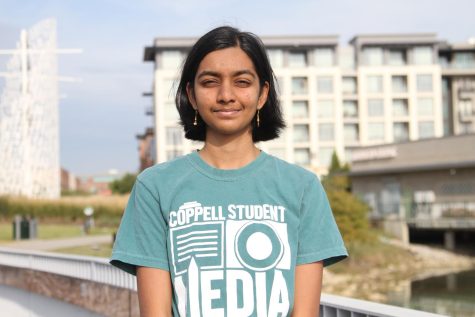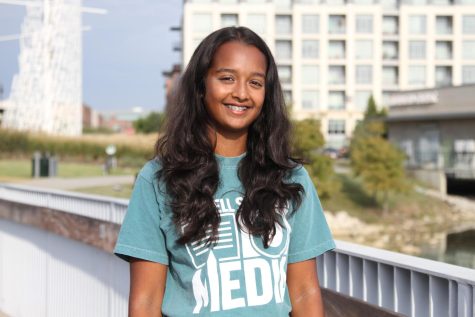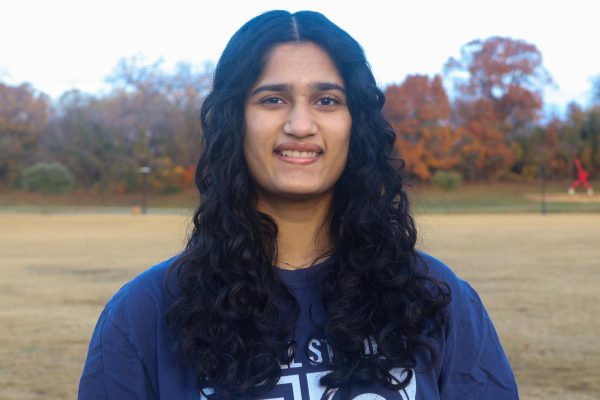Teacher of the Issue: From traveling with Peace Corps to economic consulting, Dr. Johnson applies past experiences to teaching
February 14, 2023
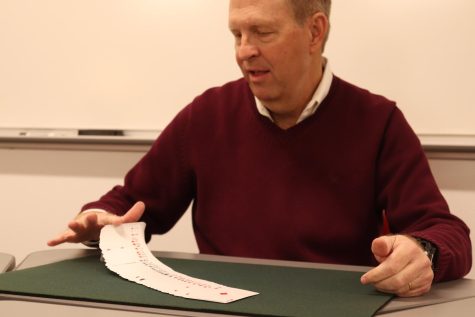
does card tricks in his classroom on Feb. 8. Prior to teaching at CHS for the past nine years, Dr. Johnson worked in the Peace Corps and practiced law. (Nandini Muresh)
Most math classes do not include magic tricks interspersed between lessons, but Dr. Lowell Johnson’s AP Statistics classes have since he first became interested in magic three years ago.
“I have a deep appreciation for magicians because it takes lots and lots of repetition to make it look effortless,” Dr. Johnson said. “You get to see the impossible happen in front of you.”
Dr. Johnson’s love for magic only started in recent years. Long before Dr. Johnson clicked on his first magic trick YouTube tutorial, he graduated from Hamline School of Law in Saint Paul, Minn. Instead of immediately practicing law, however, Dr. Johnson joined the Peace Corps.
“I figured that if I started practicing law right away, I’d soon have professional responsibilities, a mortgage, kids and I’d never get to travel,” Dr. Johnson said.
During his “eye-opening” time in the Peace Corps, Dr. Johnson taught business, math and English in two secondary schools in rural Kenya for two years.
“There are times when the best student couldn’t come back to school because the parents didn’t want to sell a cow or sell a goat in order to pay tuition,” Dr. Johnson said. “There was a time when we had the schools that I taught at that were funded by our local community, and we had a fundraising event to raise money to improve our kitchen and build a science lab. We had some local dancers come by and then the politicians come by to help in the fundraising process, and I thought, ‘Wow, I’m so lucky to see this. I sure hope in 50 years, they’re still doing these traditional dances.’ It’s so cool. I got to do things I’ve never done before in my life. Graduate school gives you lots of skills but living overseas helps you figure out who you are and what’s important.”
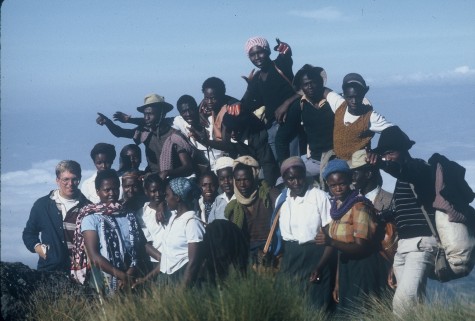
After his years of traveling, Dr. Johnson put his law degree to use and practiced law in Minnesota, Nebraska and New York as a trial attorney in civil and criminal litigation. After five years, Dr. Johnson then decided to study economics.
“I always wanted to go back and study economics,” Dr. Johnson said. “I wanted to study why some countries develop and others don’t.”
Dr. Johnson got a master’s in economics at the University of Nebraska, got his doctorate at Rutgers University and started working in New York for Law and Economics Consulting Group.
Due to family reasons, Dr. Johnson moved to Dallas, still doing consulting work but this time focused on international taxes. Five years later, one of his clients hired him to become their international tax director. Dr. Johnson taught himself accounting and tax to better fulfill the role. After nearly 11 years in that position, Dr. Johnson realized he was not learning anything new. He decided to come back to teaching, making his way to Coppell ISD at last.
“Teaching is a craft that you get better at,” Dr. Johnson said. “It’s something that you can work on. That you improve on every year. It is not about knowing your content. It is about being able to connect with students and that’s a craft. That is something that you work on. I’m still learning.”
The only school Dr. Johnson applied to work at was Coppell High School because he’s lived in Coppell since 1998 and both his son and daughter were attending CHS at the time. He has been teaching statistics at CHS for nine years.
“I was in the meeting where he was interviewing for a position here as a teacher,” CHS math teacher Ian VanderSchee said. “I got to be one of the people who asked him questions about why he wanted to teach, what his history was and find out more about him as a person to see if not only was he a proficient teacher, but also would he be a good fit on our campus, with our existing teachers and in our district as well. I was very pleased and happy with everything that he said during that interview. So when it came time to decide [if] we should hire Dr. Johnson, I was the first person to say absolutely, yes.”
VanderSchee and Dr. Johnson have remained close since that interview, hanging out during department meetings and stopping by each other’s classroom to get advice and go through new ideas with each other.
“I admire his perseverance,” VanderSchee said. “I admire his patience with his students. I admire his strong desire to learn, it’s even stronger than mine because I like to learn as much as I can about math but he likes to learn as much as he can about math and other things.”
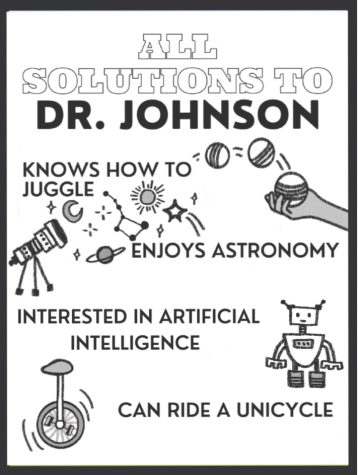
His colleagues are not the only people with a high opinion of Johnson and his teaching. He is also a favorite of students, and not just because of the fun magic tricks during class.
“He wants to do his best,” CHS senior Mytri Nair said. “He helps a lot and explains things really well. He’s definitely overqualified to be a teacher and he’s here because he has a passion for teaching. He has had so many experiences that make him who he is and because of them, he wants to help other people, like be better because of the experiences that he has had. And he also wants to experience everything. It’s refreshing because you don’t see people like in current society, especially as adults as in his age, that do want to continue to learn.”
While Dr. Johnson is paid to teach students what they need to know to pass the AP Statistics exam, he wants students to use what they learned in his class beyond that exam.
“I want to make this world a better place,” Dr. Johnson said. “I want to give students tools that they can use to help solve problems that have lasted far too long, like racism, economic inequality, climate change, issues that are going to be plaguing us for a long time. I want to give some students the tools that can help solve conflict, can help lead to solutions that are evidence based, not just knee jerk political responses. I want to give kids the empathy and worldview that is needed to motivate them.”
Follow Iniya (@iniya_v) and @CHSCampusNews on Twitter.



